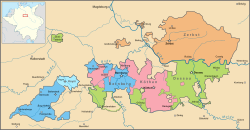Anhalt-Harzgerode
| Principality of Anhalt-Harzgerode | ||||||||||
| Fürstentum Anhalt-Harzgerode (German) | ||||||||||
| State of the Holy Roman Empire | ||||||||||
|
||||||||||
|
Anhalt territories 1747-1793, Anhalt-Bernburg (of which Anhalt-Harzgerode was a smaller part) in blue
|
||||||||||
| Capital | Harzgerode | |||||||||
| Government | Principality | |||||||||
| History | ||||||||||
| • | Partition of Anhalt-Bernburg | 5 December 1635 | ||||||||
| • | Reunion with Anhalt-Bernburg | 14 October 1709 | ||||||||
|
||||||||||

17th century arms
of Anhalt principalities
Anhalt-Harzgerode was a small principality of the Holy Roman Empire, ruled by the House of Ascania with its residence at Harzgerode in present-day Saxony-Anhalt. It was created in 1635 following the partition of Anhalt-Bernburg with Frederick, a younger son of Prince Christian I becoming the reigning prince. The death of Frederick's son Prince William Louis in 1709 resulted in the extinction of the ruling family and Anhalt-Harzgerode was reunited with Anhalt-Bernburg.
Prince Christian I ruled in Bernburg since he and his brothers had divided their Anhalt heritage in 1603. He turned to Calvinism and in 1608 founded the Protestant Union with the Lutheran princes, as deputy of Elector Palatine Frederick IV. In the beginning Thirty Years' War, he led the Bohemian army of Frederick's son Frederick V into the 1620 Battle of White Mountain, suffering a disastrous defeat. Temporarily banned and exiled in Sweden, he could not return to Bernburg until 1624.
...
Wikipedia

